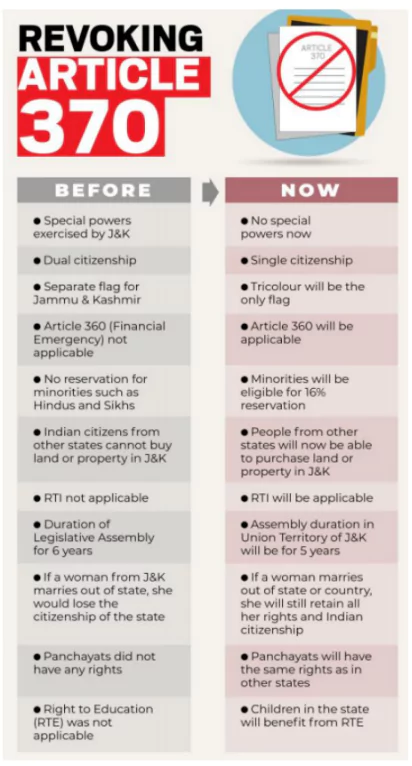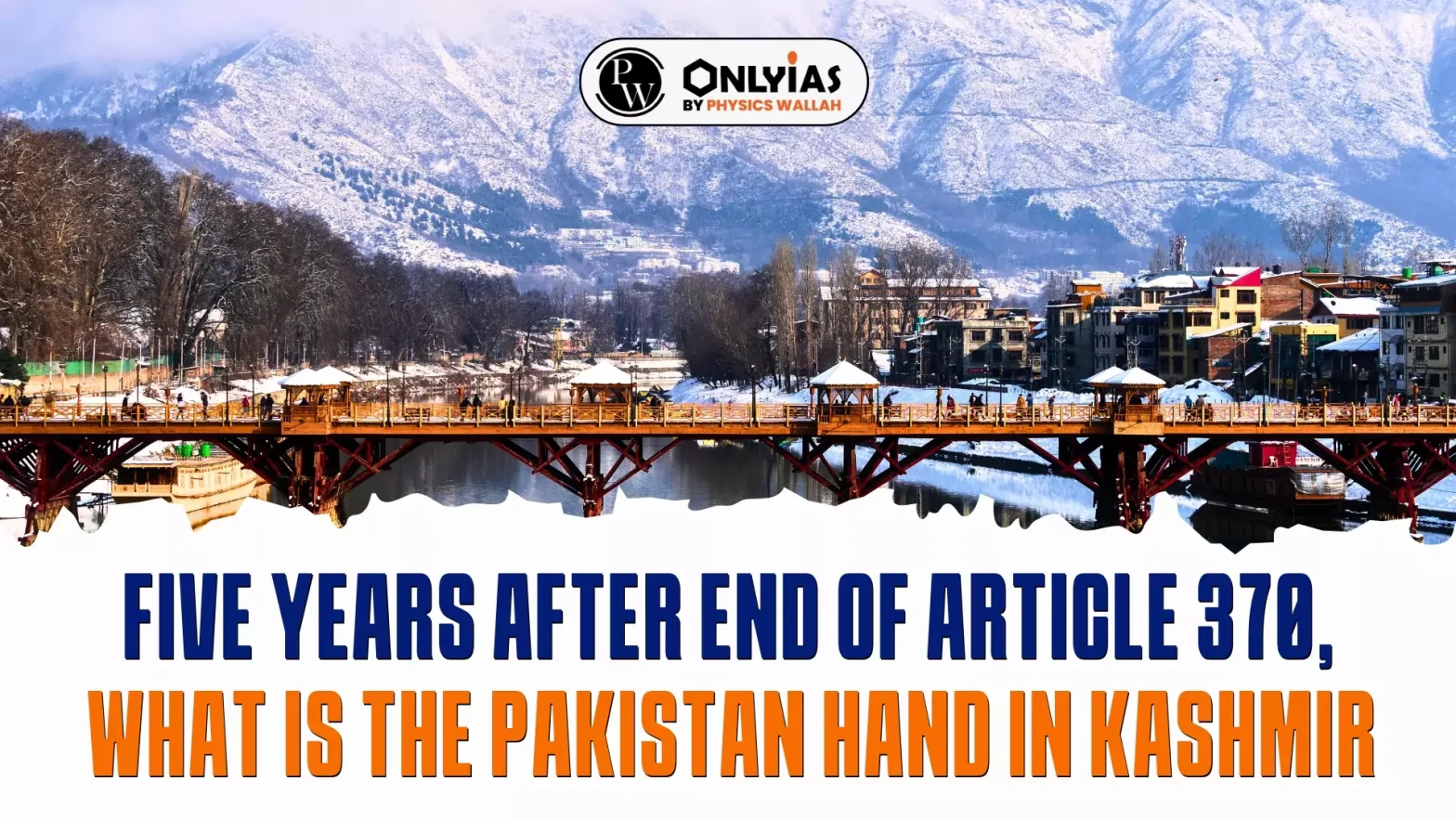Has the constitutional change in Kashmir, made five years ago, rendered the issue irrelevant to the engagement between India and Pakistan?
| Relevancy for Prelims: Article 370, Abrogation Of Article 370, 1972 bilateral agreement between India and Pakistan, etc.
Relevancy for Mains: Kashmir issue post abrogation of article 370, cross-border terrorism in Jammu, insurgency in Kashmir, etc. |
Five Years After End Of Article 370
- The answer must be both “yes” and “no”.
- By ending the ambiguity in J&K’s relationship with India, Delhi has buried the idea that its internal status is open-ended and negotiable.
 India’s growing partnerships with the West have helped blunt efforts by Pakistan and China to internationalise the Kashmir question.
India’s growing partnerships with the West have helped blunt efforts by Pakistan and China to internationalise the Kashmir question. - That does not mean the issue disappears from the template of the conflict with Pakistan.
- Note, for example, the surge in cross-border terrorism in Jammu, starting from the day when Narendra Modi was sworn in for a third consecutive term as Prime Minister of India.
- While the domestic tasks in Kashmir remain significant, Delhi can take credit for significantly reducing the global salience of the Kashmir question.
- Since Delhi decided to take the issue to the United Nations in 1948, the international dimension has hung heavy over India’s Kashmir policy.
- The 1972 bilateral agreement between India and Pakistan at Shimla, following the secession of Bangladesh, did not eliminate the third-party role in the issue.
- The Pakistan Army which had disowned the Simla agreement signed by Zulfiqar Ali Bhutto and Indira Gandhi seized the opportunity in the Kashmir turbulence of the late 1980s and renewed the effort to internationalise the question.
- The global environment after the Cold War in favour of human rights and the political devaluation of state sovereignty gave Pakistan a powerful dual strategy — support the insurgency in Kashmir and demand global intervention to pressure India into a favourable settlement.
- The frequent military crises triggered by crossborder terrorism raised international alarm about their escalation to the nuclear level (Delhi and Rawalpindi were now armed with atomic weapons).
Enroll now for UPSC Online Classes
- That, in turn, fused the Kashmir question with the new global focus on the dangers of nuclear proliferation.
- In the international narrative of the 1990s, Kashmir became the world’s “most dangerous nuclear flashpoint”.
- Fending off these multiple pressures — crossborder terrorism, unrest in Kashmir, international focus on rolling back India’s nuclear weapons — was an all-consuming challenge for Delhi at a weaker moment in its political evolution.
- Pursuing economic reforms while putting out multiple fires was not easy for the unstable coalition governments of the 1990s.
- India had overcome many of these difficulties thanks to steady economic growth and an improved relationship with the US in the 2000s.
- The George W Bush administration put an end to Washington’s Kashmir activism and found a way to resolve the nuclear dispute with India.
- But the problem of dealing with Pakistan’s cross-border terrorism and its capacity to create political trouble in Kashmir remained.
- Delhi put the Kashmir question back on the bilateral agenda with Pakistan in the 1990s.
- A serious effort was made by Prime Minister Manmohan Singh and General Pervez Musharraf to find a solution during 2004-07.
- After the ouster of Musharraf from power in 2008, his successor General Ashfaq Kayani disowned the agreed framework and resumed cross-border terrorism.
- The NDA government came to power with a clear objective to renegotiate the terms of engagement with Pakistan on Kashmir.
- This involved an effort to enhance military deterrence against cross-border terror, end the engagement with militant groups in Kashmir, and insistence that talks and terror can’t go together.
- Changing the constitutional status quo in Kashmir in August 2019 was a capstone of this strategy. But it quickly ran into a challenge from an outraged Pakistan that turned to China to put the Kashmir question on the UNSC agenda.
- Delhi, however, blocked the move with the help of Washington and Paris.
- India’s new partnerships in the West and the Islamic world, then, helped neutralise longstanding bases of international support for Pakistan and its anti-India causes.
- Facilitating this process, indeed, is the steady evolution of the economic balance of power in favour of India, whose GDP today is nearly 10 times larger than that of Pakistan.
- Pakistan’s deepening international political divisions have reinforced its economic weakness making Rawalpindi’s challenge to Delhi less salient than before.
- By refusing to engage India until Delhi reversed its constitutional changes vis a vis Kashmir, Islamabad has locked itself in a diplomatic position from which it has been hard to wriggle out.
- To be sure, there have been hints of interest from some sections of Pakistan’s civilian leaders, especially Nawaz Sharif, to renew engagement with India on a pragmatic basis.
- Qamar Jawed Bajwa — the predecessor of the current army chief, Asim Munir — had signalled flexibility in engaging India.
- But intense opposition from Imran Khan, who remains popular, has made it hard to resume even a tentative formal engagement between the two sides.
- Although India has had a relatively easier time dealing with Pakistan since August 5, 2019, Delhi should not assume that it can simply ignore Rawalpindi or that the Kashmir question is no longer relevant.
- The Pakistan army may be down, but it is certainly not out. Renewed political trouble in Kashmir will inevitably draw international attention.
- Accelerating the effort at internal reconciliation in Kashmir, countering the renewed cross-border terrorism, and connecting with diverse elements of the Pakistan polity should be at the top of India’s national security priorities.
Check Out UPSC NCERT Textbooks From PW Store
Conclusion
Five years post-Article 370, India has mitigated international focus on Kashmir, but enduring challenges with Pakistan and domestic unrest demand ongoing strategic vigilance.
![]() 9 Aug 2024
9 Aug 2024

 India’s growing partnerships with the West have helped blunt efforts by Pakistan and China to internationalise the Kashmir question.
India’s growing partnerships with the West have helped blunt efforts by Pakistan and China to internationalise the Kashmir question.